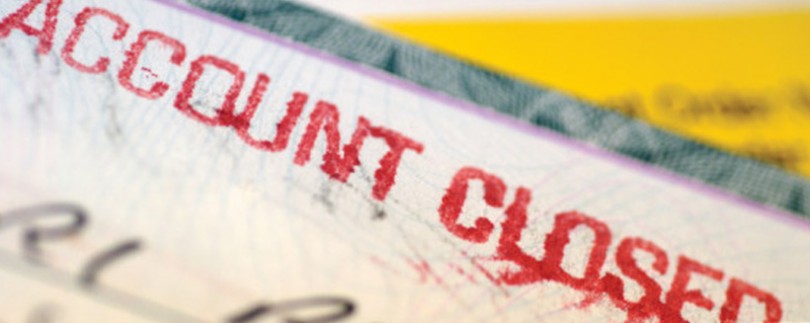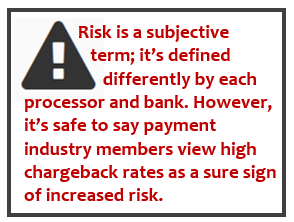https://chargebacks911.com/terminate...chant-account/https://www.cardfellow.com/chargebacks/Terminated Processing Agreement and Closed Merchant Account
July 17, 2015/ Chargebacks / 1 Comment

Merchant Accounts Are a Line of Credit
The first thing business owners need to understand is that a merchant account isn’t a depository account like a consumer checking or savings account......
There is always risk associated with any line of credit; merchant accounts are no exception. There are several high-risk situations that could happen in the period of time between the acquirer’s deposit in the merchant account and the cardholder’s payment. All of these situations would cause significant losses for the acquirer.
- The merchant could go out of business.
- Chargeback costs could exceed the account balance.
- The merchant could engage in fraud, intentionally cheating customers and the bank.
Acquirers rightfully look after their own assets. If the bank suspects elevated risk brought about by a particular merchant, the safest option is to simply terminate the processing agreement and close the merchant account.
Why Merchant Accounts Are Closed
A canceled merchant account usually results from one of three things:
- Suspicious Merchant Activity: There are several ways merchants might choose to breach the terms of their merchant processing agreement. This might include depositing transactions on behalf of another merchant or maintaining multiple merchant accounts (acquirers usually require merchants to refrain from simultaneously having active accounts with other acquirers).
- Fraud: If a merchant is committing fraud, the acquirer will understandably terminate the account. Examples of fraud include misusing credit card information, making fraudulent transactions, overcharging customers, not delivering merchandise and using misleading advertising.
- Chargebacks: Chargebacks, or forced credit card refunds, are the leading cause of terminated processing agreements.....
The majority of canceled merchant accounts are caused by excessive chargeback levels. The networks usually require merchants to keep their chargeback ratio below 1-2% (be sure to check the specifics regarding MasterCard chargeback thresholds and Visa chargeback thresholds).
However, it’s probable that a merchant account will be closed long before the card networks’ thresholds have been breached.....
Acquirers rightfully look after their own assets. If the bank suspects elevated risk brought about by a particular merchant, the safest option is to simply terminate the processing agreement and close the merchant account.
Why Merchant Accounts Are Closed
It is important to remember acquiring banks and processors are like any other business; they must carefully assess risk in relation to profitability.
Revenue Holds: The First Sign of Trouble
Merchant account reserves are common practice for high risk payment processing. Because of the increased risk level, acquirers withhold a portion of the merchant’s revenue to cover potential losses....
Usually, the acquirer will freeze the merchant’s funds for several months. If recent customers file chargebacks, the bank needs to be able to reimburse those cardholders....
The MATCH List (Member Alert to Control High-Risk Merchants) is a database with information about businesses and owners whose merchant account has been canceled. The networks require banks to report all terminated merchant accounts to the MATCH List.
MasterCard website (see table 11.3)Chargeback Fees
Unsurprisingly, the process outlined above costs merchants money in the form of chargeback fees, and businesses have to pay regardless of whether or not they win the dispute.
First up is the nominal fee charged for retrieval requests. These requests are made by issuing banks when a cardholder asks about or disputes a charge. Processors vary on what they charge, but this fee tends to fall in the range of $5-15.
If the information obtained in a retrieval request does not satisfy a customer or the customer's issuing bank, the dispute moves to a chargeback and the merchant is then hit with a chargeback fee. Merchants have to pay the chargeback fee even if the cardholder's claim is rejected, and even if the chargeback is a result of fraud or identity theft. This fee can range from $15 — 40.
If a merchant takes a dispute to the arbitration stage, she risks paying in the neighborhood of $400 in various fees to the card brand.
On top of all of these fees, both Visa and MasterCard have a strict limit on the total number of transactions that can be charged back before additional fines and penalties are levied. A merchant whose chargebacks exceed 1% of its total sales volume (the dollar amount, not the number of transactions) becomes subject to a chargeback monitoring program administered by the card brand, which is accompanied by a $5,000 fine. At this point, there is a very good chance that the merchant's account will simply be terminated by its bank or credit card processor.
The website mentioned in the previous post found only 75 Jevin websites. I have been logging the rapidly dwindling number of sites / customers for the last several years as well. With several large groups doing chargebacks, it is no mystery how this will end. Jevin claimed changing to Chase would solve all their problems in 2013 when $50,000.00 was said to be at issue. Now, Jevin will probably not be able to get any payment processor / bank to deal with them. Did Jevin already make the MATCH List? With 16 groups reporting late or missing payments totaling over $350,000.00 for this year alone, Jevin is totally cooked!04Excessive Chargebacks
With respect to a Merchant reported by a MasterCard Acquirer, the Merchant’s chargebacks in any single month exceeded 1% of its MasterCard sales Transactions in that month, and those chargebacks totaled USD 5,000 or more.


 Thanks:
Thanks:  Likes:
Likes:  LMAO:
LMAO:  Dislikes:
Dislikes:  Ignorant:
Ignorant:  Moron:
Moron: 






 Reply With Quote
Reply With Quote
Bookmarks